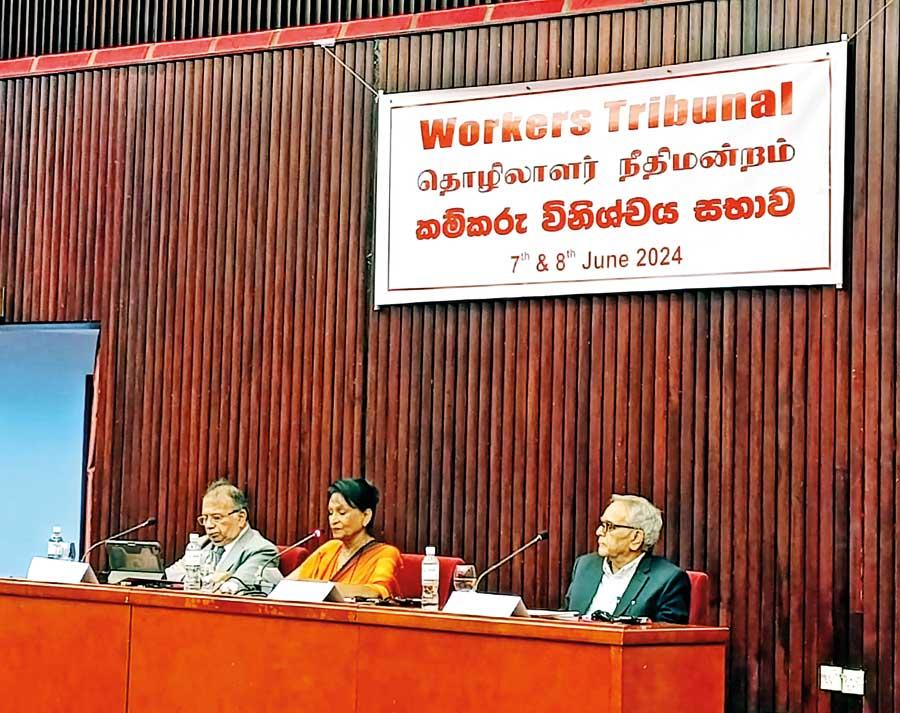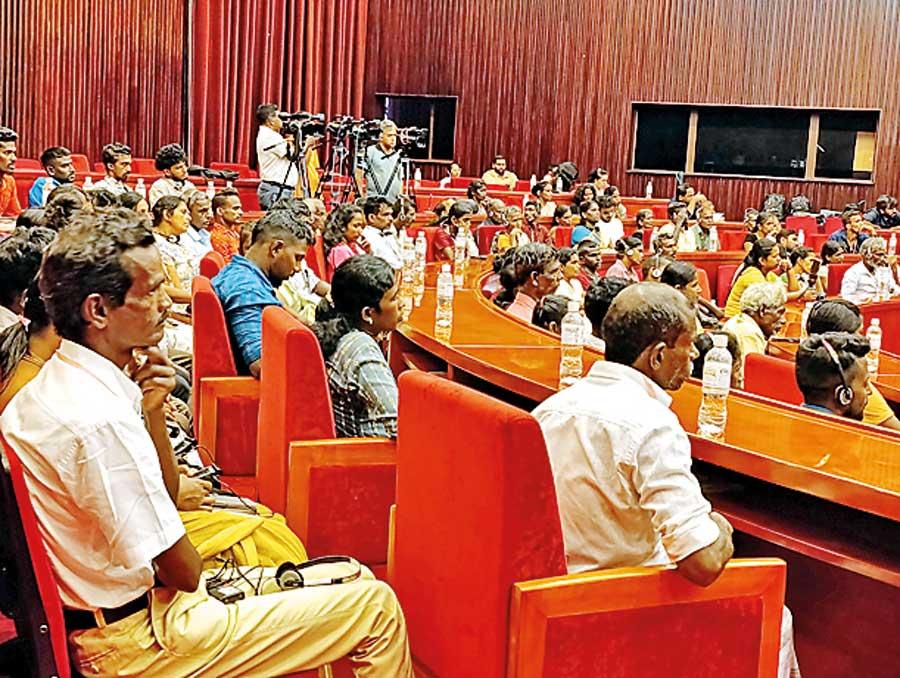11 Jun 2024 - {{hitsCtrl.values.hits}}

The Ceylon Workers’ Red Flag Union, a trade union that has been in the forefront in safeguarding workers’ rights, recently organised the first-ever Workers’ Tribunal
- The Ceylon Workers’ Red Flag Union recently organised the first-ever Workers’ Tribunal
- The three judges collectively agreed on the fact that the testimonies ‘shook’ their collective conscience
- There are indications that employers are refusing to sign a new agreement and negotiate even for the bare minimal framework of labour protection
- It is a no-win situation for the workers
- Even though the Wages Board intervened and fixed the daily wage to Rs. 1000, the challenge by employers were dismissed in courts and they are now obliged to pay this minimum wage
Plantation workers in tea and rubber estates have lived a life of discrimination and exploitation for over 200 years. Devoid of basic living conditions, a substantial wage and other fundamental rights, this community is described as a modern day example of forced labour. The Ceylon Workers’ Red Flag Union, a trade union that has been in the forefront in safeguarding workers’ rights, recently organised the first-ever Workers’ Tribunal where three esteemed judges from Sri Lanka, India and Nepal not only listened to the testimonies of plantation workers and representatives from trade unions, but also issued several recommendations to protect the rights of workers.
Devoid of basic living conditions, a substantial wage and other fundamental rights, this community is described as a modern day example of forced labour. The Ceylon Workers’ Red Flag Union, a trade union that has been in the forefront in safeguarding workers’ rights, recently organised the first-ever Workers’ Tribunal where three esteemed judges from Sri Lanka, India and Nepal not only listened to the testimonies of plantation workers and representatives from trade unions, but also issued several recommendations to protect the rights of workers.
Bonded labour in the 21st Century
Representatives from three trade unions including the Upcountry Workers’ Front, the National Union of Workers and the Ceylon Red Flag Workers’ Union and 11 plantation workers presented their testimonies. Following the two-day hearing, the bench of judges including Justice A. P Shah, former Chairman of the 20th Law Commission of India, Justice Shiranee Tilakawardane and Justice Pawan Kumar Ojha, former Attorney General of Nepal presented their thoughts, findings and recommendations to an audience that comprised estate workers, trade unions and other civil society organizations. The three judges collectively agreed on the fact that the testimonies ‘shook’ their collective conscience. The findings indicate that the Tribunal was horrified by the stark realities of the lives of tea and rubber plantation workers.
In his comments, Justice Shah said that nearly half a million people work in tea and rubber plantations; which is about 4.3% of the country’s population. “But it is appalling to learn that more than half a million people live below the poverty line with questionable health, financial and living conditions. Even after slavery had been abolished, plantation workers are living miserable, wretched lives with their paramount fundamental rights being denied. This is in my opinion nothing short of ‘bonded labour’ and it is shocking that we should have a situation like this in this day and age,” said Justice Shah.
He said that successive governments, plantation owners, people in management and all authorities have failed the workers continuously. “Minimum wages are not provided and a living wage is a distant, seemingly unreachable dream. Many of the workers have worked for generations with no palpable improvement in their quality of life,” he added.
Discarding the Collective Agreement
One important finding was with regards to the collective agreement signed in 1998 which was terminated in 2019 with just one month’s notice. The finding indicated that employers are refusing to sign a new agreement and negotiate even for the bare minimal framework of labour protection. As such, employers have unilaterally chosen to abandon the process of collective bargaining – a right recognised in the statutory framework of Sri Lanka as well as international conventions such as the ILO Convention to which Sri Lanka is a signatory. Justice Shah further said that not only did the agreement keep the wages appallingly low, but following its termination, the workers were once again left in the dark. He further said that even though the Wages Board intervened and fixed the daily wage to Rs. 1000, the challenge by employers were dismissed in courts and they are now obliged to pay this minimum wage. “In May 2024, the Labour Commissioner once again issued a gazette notifying that the daily wage has been increased to Rs. 1750, but workers don’t receive this amount as yet,” he added.
His observations revealed that workers are enticed with incentives to switch out from being formal labourers to becoming independent contractors; sometimes during the same day and sometimes, the worker is being sent from one plantation to the other. “But once people have switched over, the incentives have dwindled and wages are not being paid as promised. Either there is a reduction in the number of days these wages are being applicable for or arbitrarily, unexplained reductions are made for reasons such as not collecting enough tea leaves in a day or for other reasons. It is a no-win situation for the workers. The workers are also being stripped of all statutory rights that other workers are entitled to such as social security, pension, and gratuity and so on,” said Justice Shah.
He further said that even though the majority of plantation workers are women, they are rarely selected to managerial or decision-making positions. “Working conditions are not conducive for pregnant mothers or women in other caregiving roles. They routinely face sexual abuse and assault from supervisors and managers. Female workers hardly have any space to have a meal and in terms of sanitation there are no toilets or privacy. The conditions of plantation workers here are not comparable to other parts of the world. They are stuck in an unending loop of poverty and misery,” he underscored.
Equality before the law
Justices Tilakawardane and Ojha echoed similar sentiments and observed that the law must be equal to all. “One of the fundamental things of law which comes from the universal charter of human rights is that as human beings, we are born with equal rights of dignity, respect, identity, independence and autonomy. The law states that all people are equal before the law and then it must balance the inequalities and empower you through the law. That is what the law is there for; to ensure your rights and uphold the inequalities in power between the advantaged and the disadvantaged. That gives the cause for us to balance and empower those who are in the lower echelons of power,” said Justice Tilakawardane.
She further said that everybody has the right to life, but it doesn’t mean a vegetative life or an animal life while adding that companies that talk of Corporate Social Responsibility should incorporate ethical employment practices.
Recommendations
In its recommendations, the Tribunal determined that all stakeholders including the State should execute, without delay, the minimum wage of Rs. 1700 fixed by the government. Other recommendations include the prohibition of unfair practices adopted by plantation companies, protecting the sanctity of the tenure of collective agreements, stipulation of minimum standards for working conditions specific to tea and rubber plantation workers such as decent working hours, intervals for rest and meals, facilities for safe sanitation given the fact that plantation workers are predominantly female, recognizing the workers’ right to adequate housing, coverage of government social safety mechanisms, reception of post-retirement benefits such as EPF, ETF calculated on the basis of the full wage, formulation of a policy with regards to standards, codes, practices and guidelines in matters relating to occupational health and safety among others. The Tribunal also recommended that the government should respond proactively to stop casualisation of labour in plantations while suggesting that the government should bring in a new and separate law to protect plantation workers.
International awareness
Responding to a query from the media on what would be the next step in this process, S. A Devendrakumari representing the Ceylon Workers’ Red Flag Union said that they aim to add more pressure on the government. “We have spoken about this matter at length. But none of the previous regimes have brought about a lasting solution. There are structural inequalities at all levels and forms and systemic multiple discrimination which is clear in all testimonies. On the other hand, Ceylon Tea is being exported to many countries and we plan to alert these countries regarding the atrocities faced by plantation workers that contribute to their cuppa,” said A Devendrakumari.
She further said that the Union was pushed towards setting up a Workers’ Tribunal as all their previous pleas and demands fell on deaf ears. “We hope to practically implement these recommendations and work in solidarity with other trade unions as we continue to advocate for dignity and rights of plantations workers,” she said in conclusion.

Some participants at the the first-ever Workers’ Tribunal
24 Nov 2024 29 minute ago
23 Nov 2024 23 Nov 2024
23 Nov 2024 23 Nov 2024
23 Nov 2024 23 Nov 2024
23 Nov 2024 23 Nov 2024